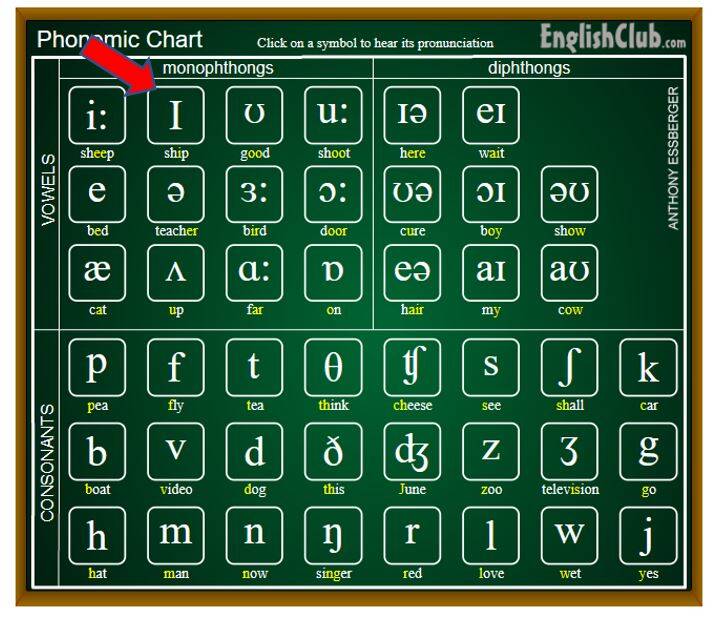Yesterday’s symbol was i: (‘sheep’, ‘seat’, ‘receive’ and ‘achieve’)
Today’s phonetic symbol is ɪ
(Chart reproduced from EnglishClub)
/ ɪ / (short vowel) is the sound you hear in words like ‘ship’, ‘kid’, and… ‘enough’.
Once you have listened to both / i: / (long vowel) and / ɪ / (short vowel) a few times, try to pronounce both ‘sheep’ and ‘ship’ clearly.
Can you now pronounce the words below? Hint: The first word on each line uses / ɪ / and the second uses / i: /
Bit and beat
Hit and heat
Chip and cheap
Fit and feet
Knit and neat
Ask an anglophone to repeat these words slowly. Can you hear the difference without reading the words?
Final question: where do you use a short / ɪ / and where do you use a long / i: / in words like city, pity, silly and pretty? Here they are with their phonetic symbols:
City = / sɪti: /
Pity = / pɪti: /
Silly = / sɪli: /
Pretty = / prɪti: /
What do you notice? Yes, ‘y’ on the end of words is pronounced as a long / i: / sound (in SSBE*).
The country name Italy is like this too – short / ɪ / in the first syllable, followed by long / i: / at the end.
As I hope you’re beginning to see, in English the difference between / i: / (long) and / ɪ / (short) is very important. The difference is important for many reasons. For example, apart from the fact that knowing the difference will immediately improve your pronunciation of English, it also means that you won’t mix up words like ‘beach’ and ‘bitch’ or ‘sheet’ and ‘sh…t’. Well, I’m sure you know which word I mean here! 😊
Can you think of any more words containing / ɪ / and / i: /? (For example university = / ɪ / / ɪ / and / i:/)
Can you think of two words where the only sound difference between them is / ɪ / and / i: /? (For example, rich / ɪ / and reach / i: / )
If so, please write these in the comments box below.
Tomorrow’s phonetic symbol will be / ʊ / .
*There are many native regional and country accents in English, and all are as valid as each other. If anyone ever tells you that one accent is better than another, this is simply not true. However, the accent I’m focussing on is 'Standard' Southern British English (SSBE), which is more or less my own accent and usually what you find in dictionaries.



Add comment
Comments